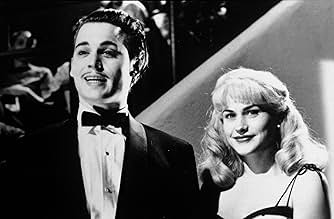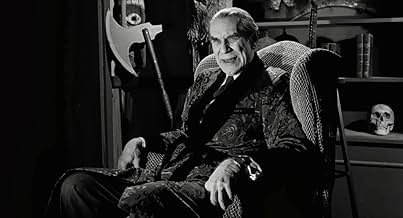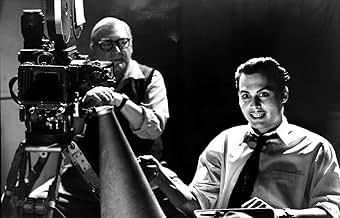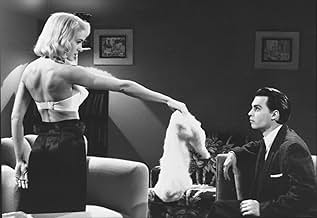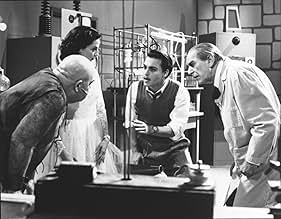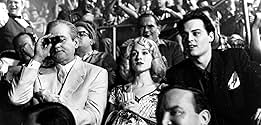La storia quasi vera di Ed Wood, unanimamente considerato come il peggiore regista di tutti i tempi. I suoi film, la sua passione per il travestitismo e la sua amicizia con la star Bela Lugo... Leggi tuttoLa storia quasi vera di Ed Wood, unanimamente considerato come il peggiore regista di tutti i tempi. I suoi film, la sua passione per il travestitismo e la sua amicizia con la star Bela Lugosi.La storia quasi vera di Ed Wood, unanimamente considerato come il peggiore regista di tutti i tempi. I suoi film, la sua passione per il travestitismo e la sua amicizia con la star Bela Lugosi.
- Regia
- Sceneggiatura
- Star
- Vincitore di 2 Oscar
- 27 vittorie e 33 candidature totali
Recensioni in evidenza
I hear that ED WOOD took just $6,000,000 on its initial cinematic release in the USA. I'm not surprised. The extraordinary thing is that the film was financed and released at all. Had it not been for the prestige that Tim Burton had already earned from his previous projects, ED WOOD would no doubt have foundered long before the cameras began to roll. The result could have been another 1941 but it wasn't. What came out of Tim Burton's fascination with the `Worst Director of All Time' was something very rich and strange perhaps the most un-Hollywood Hollywood picture of the 90s.
I see two main themes in ED WOOD. The first is the dreadful fear that hovers over everyone who enters the creative arts `Am I any good?' `Is my work any good?' `How do I know if it's any good?' `What if I think it's good, but everybody else thinks it's rubbish?' Artists use all kinds of strategies to deal with these fears some become eccentric, others arrogant, others diffident. Without the right to fail, no artist is likely to take the sort of risk that sometimes, just sometimes, leads to great work. Tim Burton knew this.
Edward D Wood Jnr believed himself to be a creative artist. Oh, how he believed. But he still failed to create anything worthwhile. And this leads to what I believe to be the second theme of the movie, and the reason why I think it failed commercially.
Look at all the things Ed did right. He believed in himself. He followed his dream. He worked hard. He was an entrepreneur he did his best to make others believe in his dream and help him to turn it into reality. In short, he did all the things that the self-help books, the daytime TV shows, the junk ballads and the feel-good movies tell us will give you success. Just wish upon a star, work all the hours there are to turn your vision into reality and you will succeed. Ed did all of these things. And still he failed. He died short of his 60th birthday, living in a crime-riddled apartment building, drunk, broke, supporting himself and his loyal wife Kathy by writing formula pornography and making sex instruction flicks on 8mm.
America doesn't want to hear this. Hollywood doesn't want to tell America this that you can try and try and try and still get nothing but heartbreak. This is why ED WOOD is such an un-Hollywood film and why it's one of the best Hollywood films of the 90s.
I see two main themes in ED WOOD. The first is the dreadful fear that hovers over everyone who enters the creative arts `Am I any good?' `Is my work any good?' `How do I know if it's any good?' `What if I think it's good, but everybody else thinks it's rubbish?' Artists use all kinds of strategies to deal with these fears some become eccentric, others arrogant, others diffident. Without the right to fail, no artist is likely to take the sort of risk that sometimes, just sometimes, leads to great work. Tim Burton knew this.
Edward D Wood Jnr believed himself to be a creative artist. Oh, how he believed. But he still failed to create anything worthwhile. And this leads to what I believe to be the second theme of the movie, and the reason why I think it failed commercially.
Look at all the things Ed did right. He believed in himself. He followed his dream. He worked hard. He was an entrepreneur he did his best to make others believe in his dream and help him to turn it into reality. In short, he did all the things that the self-help books, the daytime TV shows, the junk ballads and the feel-good movies tell us will give you success. Just wish upon a star, work all the hours there are to turn your vision into reality and you will succeed. Ed did all of these things. And still he failed. He died short of his 60th birthday, living in a crime-riddled apartment building, drunk, broke, supporting himself and his loyal wife Kathy by writing formula pornography and making sex instruction flicks on 8mm.
America doesn't want to hear this. Hollywood doesn't want to tell America this that you can try and try and try and still get nothing but heartbreak. This is why ED WOOD is such an un-Hollywood film and why it's one of the best Hollywood films of the 90s.
This is probably my favorite Tim Burton film because I love the incredibly wretched films of Ed Wood and appreciate a bio-pic of this king of dreck! Having seen BRIDE OF THE MONSTER, GLEN OR GLENDA, PLAN 9, NIGHT OF THE GHOULS AND JAIL BAIT, I was absolutely thrilled that the stories behind these films was finally brought to the screen. Plus, it was a great thrill to see the behind the scenes work that crazy of Ed did to get his horrible films made. It also helped that Johnny Depp played the character with so much energy and sincerity. It helped even more that the producers took such great pains to replicate the weird group of stock characters from the Wood films. Of course Martin Landau got a lot of attention (and an Oscar) for his portrayal of Bela Lugosi, but the rest of the characters were so close it was spooky. Plus, I admired that even the clothing and sets were dead on as well. Instead of simply making fun of Wood's horrible career, the film is more of a loving homage to a man who made rotten films that were still somehow very appealing--leading his films to be regarded as trash film cult classics. Perfect and enjoyable throughout and a truly wonderful time capsule.
I am a Johnny Depp fan, and this film only reinforced my enjoyment of his genuine talent. He's whatcha call a real actor. He's on record ("Inside the Actor's Studio" & elsewhere) as saying that his characterization of Wood was a mixture of "the blind optimism of Ronald Reagan, the enthusiasm of the Tin Man from 'The Wizard of Oz' (1939) and Casey Kasem." Well, I must add that either he left out channeling Jon Lovitz or that's where Lovitz got his inspiration, too. It is at moments positively eerie how well it works, and without feeling like Depp stole Lovitz's act--his overall character is so much more, so much else, that the Lovitz echo becomes a small part of a larger coherent whole, although it never disappears entirely.
Sarah Jessica Parker and Patricia Arquette as the principal women in Wood's life are each endearing and effective in their own separate ways. Bill Murray is fun as always, and the secondary and bit players are very well cast.
Martin Landau . . . well . . . Martin Landau simply left me awestruck. Depp is all over the screen doin' his best wacky movie guy and chewing the scenery, Parker, Arquette, Murray, and the rest are obviously having a real fun time backing him up, and Martin Landau is shuffling around in the foreground muttering in Romanian and writing a book called "How to Steal a Movie." Mind boggling performance, and absolutely deserving every award it got him in 1995, which included a Best Supporting Actor Oscar, Golden Globe and SAG Awards, and the American Comedy Award for Funniest Supporting Actor in a Motion Picture. (Incidentally, his daughter Juliet, better known to millions of Buffy the Vampire Slayer fans as the vampire Drusilla, is one of the supporting players.)
If I weren't already a Tim Burton fan this movie would have made me one. He here makes an almost perfectly crafted period piece (anachronisms noted--see the "goofs" page--and dismissed), half cheesy fake scifi B movie and half period noir thriller, as a cinematic biography about the quintessential cheesy fake noir scifi thriller B movie guy. This film goes beyond pastiche, and beyond homage to a genre, although it is both. With this film Burton genuflects--no, prostrates himself--before the gods of 1950s low-budget black and white, and the gods are pleased indeed. It seems like he must have watched every movie made in America for under a million dollars between 1948 and 1962. I lost count of the echoes and parodies and pastiches and mini-homages that fill, I think, every darn frame of the movie, and which by no means are mostly of Wood and his work.
As with, I think, every movie biography, there's the odd gratuitous fact changing (see the "goofs" page again)--you know, the "Why'd they do that when the truth wouldn't make any difference?" kind of stuff, and as glowing as this review obviously is I must also say that it is in some ways an imperfect film--it glosses over Wood's later career, for example. But it it so obviously a labor of love and joy for all involved that in my opinion its imperfections are inconsequential. Ed Wood stands proudly, with that slightly odd gleam in its eye, with the best movie biographies made.
Sarah Jessica Parker and Patricia Arquette as the principal women in Wood's life are each endearing and effective in their own separate ways. Bill Murray is fun as always, and the secondary and bit players are very well cast.
Martin Landau . . . well . . . Martin Landau simply left me awestruck. Depp is all over the screen doin' his best wacky movie guy and chewing the scenery, Parker, Arquette, Murray, and the rest are obviously having a real fun time backing him up, and Martin Landau is shuffling around in the foreground muttering in Romanian and writing a book called "How to Steal a Movie." Mind boggling performance, and absolutely deserving every award it got him in 1995, which included a Best Supporting Actor Oscar, Golden Globe and SAG Awards, and the American Comedy Award for Funniest Supporting Actor in a Motion Picture. (Incidentally, his daughter Juliet, better known to millions of Buffy the Vampire Slayer fans as the vampire Drusilla, is one of the supporting players.)
If I weren't already a Tim Burton fan this movie would have made me one. He here makes an almost perfectly crafted period piece (anachronisms noted--see the "goofs" page--and dismissed), half cheesy fake scifi B movie and half period noir thriller, as a cinematic biography about the quintessential cheesy fake noir scifi thriller B movie guy. This film goes beyond pastiche, and beyond homage to a genre, although it is both. With this film Burton genuflects--no, prostrates himself--before the gods of 1950s low-budget black and white, and the gods are pleased indeed. It seems like he must have watched every movie made in America for under a million dollars between 1948 and 1962. I lost count of the echoes and parodies and pastiches and mini-homages that fill, I think, every darn frame of the movie, and which by no means are mostly of Wood and his work.
As with, I think, every movie biography, there's the odd gratuitous fact changing (see the "goofs" page again)--you know, the "Why'd they do that when the truth wouldn't make any difference?" kind of stuff, and as glowing as this review obviously is I must also say that it is in some ways an imperfect film--it glosses over Wood's later career, for example. But it it so obviously a labor of love and joy for all involved that in my opinion its imperfections are inconsequential. Ed Wood stands proudly, with that slightly odd gleam in its eye, with the best movie biographies made.
It is a well known fact by now that Johnny Depp is a subtle, tender, beautiful force of nature. Tim Burton has been able to create universes that Johnny Depp can inhabit with the strange naturalness of someone who belongs. "Ed Wood" is the ultimate demonstration of that theory. You're introduced to the world of someone who appears almost a figment of someone's imagination to realise that there is something of him in you and me. What is incredible is that the realisation comes hand in hand with a personal discovery. That funny weird kid represents more than something but the best of you and me. Angora sweaters and childish dreams. The purity of an artist with a talent that is concentrated in his heart. Remember the Salieri of "Amadeus" torturing himself cursing God for giving him the gift of recognising the talent in others without having any of his own. Ed Wood, as told by Burton and Depp, is so far away from that pathology that to watch his films after having met him with Johnny's face is an entirely different experience. Everything makes sense. Strangely enough (or not) "Ed Wood" died at the box office but as it happens more often than not, "Ed Wood" is more alive today than many of the greatest moneymakers of all time. Yes, that business of time never fails. Greatness prevails.
It's appropriate that Tim Burton would direct this and even more appropriate that Johnny Depp would play the lead character as this story profiles an unusual subject: the worst director of films, perhaps, in Hollywood history....and one of its strangest characters.
As interesting as the story is, I found the black-and-white photography to be the best aspect of the film, but that's no surprise since Burton usually excels in making great visual films. Depp was hilarious as "Ed Wood." The eternal optimistic attitude and silly smile on his face in this film always makes me laugh and actually is inspiring in parts. You can't help but like poor Ed.
The most dramatic figure is Bela Lugosi, played memorably by Martin Landau, who deservedly won many awards for this performance. What a tragic figure.
To no surprise, there is a cheap shot against Baptists, who are made to look like meddling fools, something Hollywood loves to portray when it comes to any Christian character. Other than that, it's a fascinating film and portrait of a weirdo that only real-life weirdo Johnny Depp could do justice!
As interesting as the story is, I found the black-and-white photography to be the best aspect of the film, but that's no surprise since Burton usually excels in making great visual films. Depp was hilarious as "Ed Wood." The eternal optimistic attitude and silly smile on his face in this film always makes me laugh and actually is inspiring in parts. You can't help but like poor Ed.
The most dramatic figure is Bela Lugosi, played memorably by Martin Landau, who deservedly won many awards for this performance. What a tragic figure.
To no surprise, there is a cheap shot against Baptists, who are made to look like meddling fools, something Hollywood loves to portray when it comes to any Christian character. Other than that, it's a fascinating film and portrait of a weirdo that only real-life weirdo Johnny Depp could do justice!
Lo sapevi?
- QuizUnhappy with Vincent D'Onofrio's verbal impersonation of Orson Welles, Tim Burton had his voice dubbed by Maurice LaMarche.
- BlooperAccording to those who knew him, Bela Lugosi never used profanity.
- Citazioni
Orson Welles: Visions are worth fighting for. Why spend your life making someone else's dreams?
- Curiosità sui creditiThe movie ends with the simple line "Filmed in Hollywood, USA", the same way the real Edward D. Wood Jr. did it at the end of his movies.
- Colonne sonoreBunny Hop
Written by Ray Anthony and Leonard Auletti
Performed by John Keating
Courtesy of Gateway Records
I più visti
Accedi per valutare e creare un elenco di titoli salvati per ottenere consigli personalizzati
Dettagli
- Data di uscita
- Paese di origine
- Lingua
- Celebre anche come
- Kẻ Bất Tài
- Luoghi delle riprese
- Aziende produttrici
- Vedi altri crediti dell’azienda su IMDbPro
Botteghino
- Budget
- 18.000.000 USD (previsto)
- Lordo Stati Uniti e Canada
- 5.887.457 USD
- Fine settimana di apertura Stati Uniti e Canada
- 71.566 USD
- 2 ott 1994
- Lordo in tutto il mondo
- 5.888.242 USD
- Tempo di esecuzione
- 2h 7min(127 min)
- Colore
- Mix di suoni
- Proporzioni
- 1.85 : 1
Contribuisci a questa pagina
Suggerisci una modifica o aggiungi i contenuti mancanti






